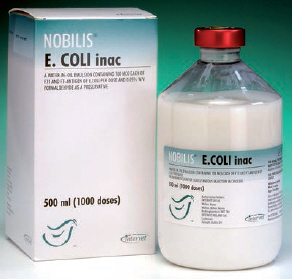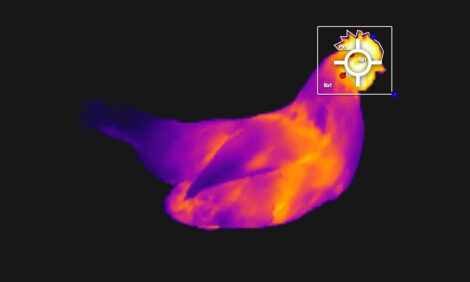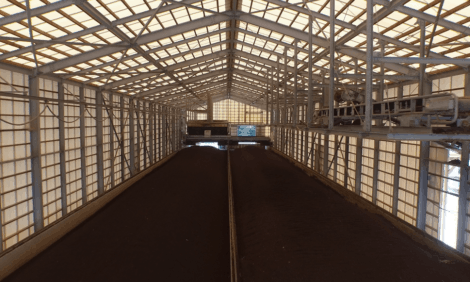



Colibacillosis and its Impact on the Poultry Business
Dr Tibor Cserep, DVM MRCVS, Technical Manager for MSD Animal Health, explains the poultry health problems caused by E. coli and how the company's vaccine, Nobilis E.coli inac, can provide an effective solution to protect broilers, breeders and layers from the bacterium. Last year’s wet weather has changed the terrain of many free-range farms dramatically. Birds have access to many puddles on the range, which may be contaminated by all kinds of pathogens including E. coli. As a result the number of free-range flocks affected by peritonitis has increased, causing higher mortality rates and reduced performance.
Last year’s wet weather has changed the terrain of many free-range farms dramatically. Birds have access to many puddles on the range, which may be contaminated by all kinds of pathogens including E. coli. As a result the number of free-range flocks affected by peritonitis has increased, causing higher mortality rates and reduced performance.
Both pullet rearers and broiler producers have reported higher than usual first-week mortalities due to poor chick quality and E. coli-associated infections. The most typical of these infections is yolk sac infection. Furthermore, as a secondary opportunistic bacterium, E. coli can play a role in some bone and joint infections affecting poultry flocks in each sector recently.
Control of E. coli
The prevention of colibacillosis is generally based on management measures aiming to decrease infectious pressure and improving the housing conditions of birds. Such measures include:
- Egg and hatchery hygiene at breeder level to reduce vertical transmission
- Adequate ventillation, good quality litter etc. at broiler level
- Vaccination of broilers against respiratory diseases
In spite of all these measures, the use of antibiotics is still inevitable in many cases. Because of the high costs, residue problems and growing political issues around the use of antimicrobials, alternative methods are needed. One of them is, no doubt, E. coli vaccination.
Choice of Antigens
The most promising antigens for vaccine production are those that play a role in virulence. Investigations have shown that E. coli strains isolated from hearts of chickens suffering from colibacillosis produce fimbriae that are identical to those of the F11-type. Furthermore, serological examinations have clearly demonstrated that the vast majority of birds suffering from E. coli septicaemia are positive for F11-type antibodies. Fimbrial antigen of the F11-type was therefore a logical candidate for a vaccine.
It has also been shown that E. coli flagellae are associated with a profound toxic activity towards day-old chickens and Vero cells. This activity had hitherto not been recognised. The toxins are found in a large number of E. coli strains, and are referred to here as flagellar toxins (FT) because of their striking appearance as flagellar structures. Antiserum against this antigen was found to be cross-reactive with and cross neutralising to FT of all other E. coli strains tested.
MSD’s E. coli vaccine (Nobilis® E.coli inac) is a sub-unit vaccine containing the F11-type fimbrial antigen and the flagellar antigen FT. Either one or both of these antigens are expressed by 93 per cent of the 203 E. coli strains collected from all over the world, therefore, this vaccine can offer a broader spectrum of activity than the vaccines based on one or two serotypes.
Efficacy of Nobilis E.coli inac
 Although the pathogenesis of avian colibacillosis is still not completely clear, strong indications have been found that F11 and FT are involved. The ability of antibodies against F11 and FT to protect chickens against infection with pathogenic E. coli strains has been demonstrated in laboratory trials.
Although the pathogenesis of avian colibacillosis is still not completely clear, strong indications have been found that F11 and FT are involved. The ability of antibodies against F11 and FT to protect chickens against infection with pathogenic E. coli strains has been demonstrated in laboratory trials.
Furthermore, indications have been found that antibodies in eggs are able to decrease the rate of vertical transmission of virulent E. coli strains.
During the development of Nobilis E.coli inac after encouraging laboratory results, field trials were carried out with the final product. Results of the field trials in The Netherlands, Germany, Japan, Hungary, Thailand and the UK went on to show clearly the benefit of vaccination for broilers, layers and breeders.
The biggest benefit demonstrated for broilers was the reduced first-week mortality as expected from the lab trials. For broiler breeders, improved performance was seen in terms of hatchability and fertility. Finally, in some commercial layer flocks, mortality due to peritonitis was reduced even after one dose of Nobilis E.coli inac resulting in better performance and less medication cost.
Poultry flocks can be monitored by serological tests to see if they have been exposed to pathogenic E. coli expressing FT and F11 antigens. If you are interested in this service from MSD in the UK, please contact 0370 0603380.
November 2013









